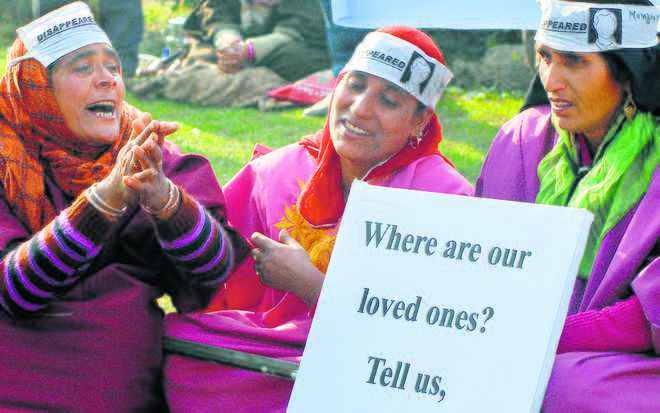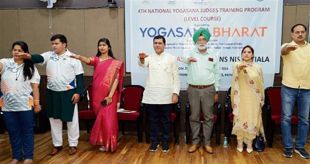
Five residents of villages around Pathribal were allegedly abducted by the Army days before their encounter Tribune photo: Amin War
Vijay Mohan in Chandigarh
LIFE imprisonment to a major-general, two colonels and four other ranks by a Summary General for allegedly killing innocent civilians in a fake encounter in Assam 24 years ago has brought back the focus on similar cases of abrasion by the Army in the past. While it is for the first time that an officer of the rank of major-general has been tried for such charges, there have been several instances of junior officers being in the dock over allegations of extrajudicial overreach.
Though the breakup of the number of officers tried under court martial, according to the type of offence, is unavailable, the Minister of State for Defence, Dr Subhash Bhamre, stated in Parliament in March 2018, that the number of Army personnel prosecuted by court martial or other internal disciplinary proceedings for various offences defined under the Army Act during 2015, 2016 and 2017 was 47, 54 and 51, respectively.
“Cases concerning fake encounters are rare and such things happen due to over aspiration of officers to show better results or when the focus of commanders is only on the number of terrorists neutralised,” Col SK Aggarwal, a former officer in Judge Advocate-General’s department, who has been handling such matters, said. “These are rare abrasions rather than generality,” he added.
Injustice in Pathribal
The Pathribal case has been hanging fire for the past 18 years with the matter pending before the Supreme Court. On March 25, 2000, personnel of the 7 Rasthriya Rifles purportedly carried out an operation to neutralise five “foreign militants” in the forests of Pathribal in the Anantnag district of Jammu and Kashmir. The Army claimed they were responsible for the massacre of 36 Sikh men at Chattisinghpora five days before. Locals, however, contended that the five men were actually residents of villages around Pathribal, who had been abducted by the Army and the police a couple of days before the encounter. After long-drawn protests, investigations into the matter were handed over to the CBI in February 2003, which after exhuming the bodies and carrying out DNA tests and other forensic investigations, filed a chargesheet against five personnel of the 7 RR. In May 2012, the Supreme Court gave the Army the option of trying the personnel by a court martial or a criminal trial in a civilian court. The Army went in for a court martial and closed the case at the summary of evidence stage. The Army’s decision was challenged in the Jammu and Kashmir High Court, which upheld the Army’s decision in April 2016. Families of the deceased persons moved the apex court in July 2016 against the high court’s ruling.
The Macchil encounter
In 2014, a court martial awarded life imprisonment to a colonel and four other ranks after they were found guilty of killing Shahzad Ahmad Khan, Mohammad Shafi Lone and Riyaz Ahmad Lone in a staged encounter in the Macchil area of Kupwara district in Kashmir. In 2010, the three Kashmiri men had been lured to an Army camp by a former special police officer and his accomplices to ostensibly work as porters, but were passed off as foreign insurgents and killed near the Line of Control under the pretext of trying to infiltrate. In 2017, the Armed Forces Tribunal granted an interim stay on the operation of the sentence and granted bail to five of the six accused after their lawyer contended that there was no direct evidence against the convicted personnel and the circumstantial evidence was also questionable. The sixth person, a Territorial Army jawan, was already out on bail.
The Ketchup Colonel case
There have also been contentions that, at times, there is pressure from senior commanders on unit commanders to “produce” results that could add to the formation’s operational profile, as could been seen from the case of a colonel who was dismissed by a court martial in 2004. Known as Ketchup Colonel, he had claimed in a petition challenging his trial that he was ordered by his superiors, a brigadier and a major-general, to kill five terrorists that his unit had captured in southern Assam in 2003 and then initiate a case for gallantry awards. Though he refused and handed over the terrorists to the police, under pressure he agreed create a fictitious encounter scene by photographing the terrorists posing as dead with ketchup splashed over them to simulate blood. Later, on the basis of an anonymous complaint alleging a fake encounter and false claims on his part, he was court martialed.
Violations aplenty
“Fake encounters” have not been restricted to anti-terrorist operations. In 2004, a major was cashiered and sentenced to three years rigorous imprisonment for faking killing enemy soldiers while deployed in with his battalion in the Siachen sector by having his own men posing as dead Pakistani soldiers. This was done for career progression. In August this year, the CBI booked a major, then on deputation with the Assam Rifles, along with seven other uniformed personnel, in connection with the killing of a 12-year-old boy in Imphal in 2009. This was consequent to the Supreme Court’s directions to the CBI to investigate a large number of allegations of fake encounters and human rights violations by security agencies in the Northeast.



























